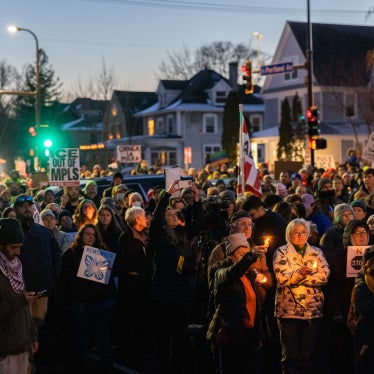(New York) – A Bangkok criminal court’s dismissal of charges against former Thai leaders for their role in the violent crackdown on protesters in May 2010 is a serious setback for accountability efforts in Thailand, Human Rights Watch said today.
On August 28, 2014, the criminal court ruled that it had no jurisdiction to try former Prime Minister Abhisit Vejjajiva and former Deputy Prime Minister Suthep Thaugsuban because they were political officeholders at the time. International human rights treaties to which Thailand is a party make clear that official status cannot justify immunity from legal responsibility for serious human rights violations. However, the court found that Abhisit’s and Suthep’s decisions to authorize security forces to use live ammunition had led to the high number of casualties and that dispersal operations did not follow international standards on the use of lethal force. Prosecutors can appeal the criminal court’s ruling denying jurisdiction.
“Letting Thailand’s leaders during the 2010 violence off the hook merely because of their positions is an affront to basic justice and international law,” said Brad Adams, Asia director. “No government or military leader should be allowed to escape accountability for killings and other serious abuses simply because of their position or rank. The ruling on excessive force by the security forces, which could open the door to criminal prosecutions of those involved in the bloody crackdown, was more promising.”
The Justice Ministry’s Department of Special Investigation (DSI) had charged Abhisit and Suthep with murder and attempted murder for ordering the military crackdown on protesters in 2010. The DSI filed the charges after inquests found that protesters were killed and wounded by gunshots fired by soldiers acting on the orders of the Center of the Resolution of the Emergency Situation (CRES), which Abhisit set up under Suthep’s command. The military crackdown on the United Front for Democracy against Dictatorship (UDD), known as the “Red Shirts,” took place between April 7 and May 19, 2010, and resulted in at least 98 deaths and more than 2,000 injuries.
The criminal court also ruled that the case against Abhisit and Suthep fell under the jurisdiction of the Supreme Court’s Criminal Division for Holders of Political Positions. Since a petition had been filed against Abhisit and Suthep with the National Anti-Corruption Commission (NACC), which is responsible for handling criminal cases against politicians, it is duty-bound if it has sufficient evidence to forward the case to the criminal division for further consideration.
By referring the case to the NACC, the criminal court essentially transformed an important criminal investigation into an inquiry regarding abuse of official positions. The ruling undermines Thailand’s obligations under international law to ensure the right to an effective remedy for victims of serious human rights violations, including unlawful killings. A victim’s right to an effective remedy requires that the government take the necessary investigative, judicial, and reparatory steps to redress the violation and address the victim’s rights to knowledge, justice, and reparations. The government is under a continuing obligation to provide an effective remedy; there is no time limit on legal action and the right cannot be compromised even because of a state of emergency.
After four years, successive Thai governments have failed to impartially investigate and prosecute all those responsible for the 2010 political violence. Human Rights Watch concluded in a May 2011 report, “Descent into Chaos: Thailand’s 2010 Red Shirt Protests and the Government Crackdown,” that excessive and unnecessary force by the army caused many deaths and injuries during the 2010 confrontations. The high number of casualties – including unarmed demonstrators, volunteer medics, reporters, photographers, and bystanders – resulted in part from the enforcement of “live fire zones” around the UDD protest sites in Bangkok. The CRES approved the use of live ammunition, sharpshooters, and snipers to contain and disperse the protests, but failed to take steps to ensure the army acted according to law enforcement standards.
Human Rights Watch has also consistently pressed for investigations into alleged crimes by the UDD-linked “Black Shirt” militants. Despite clear photographic and other evidence, the UDD leadership and its supporters, including those holding positions in the Pheu Thai Party, deny that the UDD had armed elements at the time of the 2010 events.
The Abhisit government summarily and excessively charged hundreds of UDD protesters with serious criminal offenses, but it did not file charges against any government officials or soldiers. Shortly after taking office in 2011, Prime Minister Yingluck Shinawatra publicly promised to investigate and prosecute the security forces for the 2010 violence.
However, her government apparently gave in to pressure from the army to not prosecute military personnel. In November 2013, the then-ruling Pheu Thai Party and its partners in the government coalition pushed a broad amnesty bill through the lower house of parliament, triggering mass anti-government protests, led by the People’s Democratic Reform Committee (PDRC), which sought the resignation of the Yingluck government. Months of sporadic violence in Bangkok resulting from anti-government protesters clashing with pro-government groups and the police finally ended when the military intervened and staged a coup on May 22, 2014.
The prospects for justice for abuses committed during the 2010 violence appear bleak under the military junta, the National Council for Peace and Order (NCPO). The junta leader, Gen. Prayuth Chan-ocha, who was appointed prime minister on August 22, 2014, has repeatedly said in public that soldiers should not be condemned for the 2010 killings. Investigations by the police, the DSI, and the NACC all indicated that military officers would not be held responsible for unlawful deaths and injuries during the 2010 crackdown because they were acting under orders from the Abhisit government.
“The Department of Special Investigation and the National Anti-Corruption Commission should not allow the criminal court’s ruling to deter them from pursuing all avenues to bring those responsible for the 2010 killings to justice,” Adams said. “An important lesson from 2010 is that failure to end impunity will fuel future lawlessness and violence in Thailand. This is particularly important now, when Thailand is living under a military junta that controls all state powers.”






